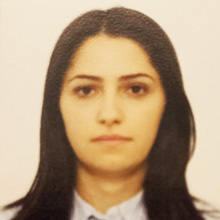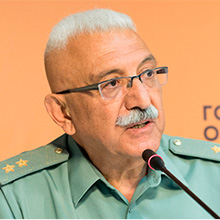
The Great Game in the Levant: Russia’s Interests in Lebanon  By Yeghia TASHJIAN, Beirut-based regional analyst and researcher, columnist, "The Armenian Weekly” By Yeghia TASHJIAN, Beirut-based regional analyst and researcher, columnist, "The Armenian Weekly”
Like other regional powers, Russia has taken major steps to advance its geopolitical interests in the Levant. With the goals of expanding its influence and control the vast energy resources in the region. Although it only has a naval military base in Tartus (Syria) and no borders on the Mediterranean Sea, Russia has managed to exert its influence around nearby countries, including Lebanon. The perception of Lebanon as part of its Syrian stake encourages Moscow to strive to capitalize on its influence in the region after intervening in the Syrian conflict. In the last few years, Russia started playing a larger role in Lebanon following the growing civil unrest in Syria and the defeat of ISIS. READ MORE
- EGF Editor |
Published on EGF: 04.09.2021
| External Relations
-
The U.S. Policy in the South Caucasus after the 2020 Karabakh War  By Benyamin POGHOSYAN, PhD, Chairman, Center for Political and Economic Strategic Studies By Benyamin POGHOSYAN, PhD, Chairman, Center for Political and Economic Strategic Studies
The 2020 Karabakh war has significantly impacted the regional dynamics in the South Caucasus. Experts and pundits have not come yet to a unified approach regarding the reasons and implications of the war. However, many agree that the primary beneficiaries of the war were Russia and Turkey. Kremlin has reached perhaps its main goal in Karabakh – to put Russian boots on the ground, while it has also significantly increased its military presence in Armenia. Turkey has cemented its presence in Azerbaijan as now a large part of Azerbaijani society believes that without Turkey’s overt support and involvement, Baku could not win the war. Turkey also is a part of the Joint Monitoring Centre operating in the Aghdam region of Azerbaijan, though Turkey hoped to have more military involvement in the post-war Karabakh. READ MORE
- EGF Editor |
Published on EGF: 03.09.2021
| External Relations
-
An Impressive EU Aid Package to Armenia Does not Solve Yerevan’s Dilemma on Karabakh  By Benyamin Poghosyan, PhD, Chairman, Center for Political and Economic Strategic Studies By Benyamin Poghosyan, PhD, Chairman, Center for Political and Economic Strategic Studies
The EU has thrown Armenia an economic lifeline, but Yerevan has a stark choice ahead: either to use its economic resources to modernise its military and ensure that the Armenian population left in Karabakh is protected, or to create conditions for the Armenians in Karabakh to gradually settle in Armenia.
The EU has always perceived the South Caucasus as a neighbouring area between Europe, the Middle East, and Central Asia. The South Caucasus was never part of the EU's vital interests, but the Europeans were not indifferent to the region's fate. After the collapse of the Soviet Union, the EU signed Partnership and Cooperation Agreements with South Caucasus Republics, and later included the region into the European Neighbourhood policy. The next phase in EU-South Caucasus relations was the launch of the Eastern Partnership initiative and the inclusion of Armenia, Azerbaijan, and Georgia into the program. READ MORE
- EGF Editor |
Published on EGF: 27.07.2021
| External Relations
-
To Open Transport Links in the South Caucasus, Azerbaijan Needs to Avoid the term “Zangezur Corridor”  By Benyamin Poghosyan, PhD, Chairman, Center for Political and Economic Strategic Studies By Benyamin Poghosyan, PhD, Chairman, Center for Political and Economic Strategic Studies
Armenia always supported the idea of restoring communications and developing economic relations with Azerbaijan as a tangible way of confidence building. However Azerbaijan has to give up its inflammatory and disruptive rhetoric about the "Zangezur Corridor", and its thinly veiled threats to take over the Syunik province from Armenia.
The 10 November 2020 tripartite statement signed by Armenia, Azerbaijan and Russia ended the war in Nagorno Karabakh, but evidently, did not bring peace to the region. A range of complex issues remain to be settled – the future of Nagorno Karabakh, relations between Armenia and Azerbaijan, and the security dynamics of the broader region. Given the Russian military presence in Karabakh, the region's future now mostly depends on the Kremlin, and neither Armenia nor Azerbaijan has much room for manoeuvre here. The status of Karabakh will remain a topic in bilateral Russia–Azerbaijan and Russia–Armenia discussions, but Moscow will do whatever it thinks it is necessary to do. READ MORE
- EGF Editor |
Published on EGF: 19.07.2021
| External Relations
-
Armenian Foreign Policy in the Context of the Transformation of Global Order  By Lilit Galstyan, Senior Research Fellow, Academy of Political Studies, Yerevan By Lilit Galstyan, Senior Research Fellow, Academy of Political Studies, Yerevan
The end of the Cold War and the collapse of the Soviet Union have ushered in hopes of humanity's happy and harmonious future. The ideas such as "End of history" became very popular both within academic circles and with policymakers. There was a widespread belief that the entire planet would live under liberal democracy, and inter-state conflicts will become bad memories from history. However, the beginning of the XXI century crushed these hopes. Russia - West relations started to deteriorate after the 2004 Orange Revolution in Ukraine, while the 2014 Crimean crisis brought bilateral relations to the lowest point since the end of the Cold War. Meanwhile, the astonishing Chinese economic growth and the emergence of the multi-million middle class did not bring about political changes in China. READ MORE
- EGF Editor |
Published on EGF: 19.07.2021
| External Relations
-
Containing China Is No Longer Possible Despite the Fact that Many Want To  By Benyamin Poghosyan, PhD, Chairman, Center for Political and Economic Strategic Studies By Benyamin Poghosyan, PhD, Chairman, Center for Political and Economic Strategic Studies
China was on everyone's lips at numerous summits and international gatherings in the last days and weeks. "China will be among the key world players throughout the 21st century; it will be the number one economic power, and all have to accept and adapt to this reality. Many are not happy with this prospect and would like to prevent it from becoming a reality, but no one has the necessary capacity to contain China, despite the fact that many want to, for the moment for doing that has passed."
While many states make efforts to eventually overcome the outcomes of the COVID 19 pandemic through a large-scale vaccination process, and seek to return to the pre-2020 life, geopolitics, somehow pushed to the corner by the disease, returns to the spotlight. Recent weeks saw a chain of global summits – G7, NATO, and the USA-Russia meeting. The world leaders discussed many topics – climate change, the restoration of the transatlantic alliance, relations with Russia. However, the most repeated word in all these gatherings was China. “Rise of China”, “China's challenge”, “assertive China”, “China-led world order”, “China hegemony in Asia” – this is perhaps not the complete list of China-related phrases. READ MORE
- EGF Editor |
Published on EGF: 07.07.2021
| External Relations
-
Russia-Turkey Relations after the Karabakh War: A View from Armenia  By Benyamin Poghosyan, PhD, Chairman, Center for Political and Economic Strategic Studies By Benyamin Poghosyan, PhD, Chairman, Center for Political and Economic Strategic Studies
Russia – Turkey relations are probably among the most discussed topics of Eurasian geopolitics. Experts and pundits are frantically searching for the correct terms to describe them – cooperation/competition, the marriage of convenience, and frenemies – all these words are used in endless efforts to grasp reality beneath the surface of high-level meetings and smiley handshakes of the leaders. The two countries interact in different regions – Middle East, Northern Africa, Black Sea basin, Central Asia, Western Balkans, and South Caucasus. In all these areas, they have overlapping and colliding interests, which have created a complex web of relationships. READ MORE
- EGF Editor |
Published on EGF: 27.06.2021
| External Relations
-
The Architecture of an Innovative Strategic Union Russia-Armenia  Hayk Kotanjian, Lieutenant General (ret), Professor of RA, RF, USA (strategic security studies), Lazarev Club Board Member Hayk Kotanjian, Lieutenant General (ret), Professor of RA, RF, USA (strategic security studies), Lazarev Club Board Member
The strategic emphasis of the 4th session of the Lazarev Club has been imperatively demanded by the need to find and pursue new ways to prevent the loss of the Armenian national statehood. The end-product of those efforts should be built upon the coincidence of the strategic interests of security and sustainable development of our two fraternal peoples and allied states - Russia and Armenia. The existential importance of brainstorming on the problem of life and death of the state, as well as its innovative development, was exacerbated by the challenge of the upcoming formation of new authorities following the results of the early parliamentary elections. READ MORE
- EGF Editor |
Published on EGF: 27.06.2021
| External Relations
-
Armenia's June Elections May Lead to Further Uncertainty and Instability  By Benyamin Poghosyan, PhD, Chairman, Center for Political and Economic Strategic Studies By Benyamin Poghosyan, PhD, Chairman, Center for Political and Economic Strategic Studies
Sunday's parliamentary elections in Armenia are hotly contested, and the electorate is actively engaged in the campaigning. But the election is likely to lead to further uncertainty and continued instability.
The official campaign for the 20 June 2021, early parliamentary elections in Armenia started on 7 June 2021. Twenty-five political entities are contesting the elections – 21 parties and four alliances (blocs). No election in the modern history of Armenia has seen such quantity and diversity of contenders. However, despite this impressive number, only a few participants have a real chance to overcome the threshold to enter Parliament – 5 percent for parties and 7 percent for alliances. READ MORE
- EGF Editor |
Published on EGF: 16.06.2021
| External Relations
-
The Inexorable Drive for Socio-Political Reforms in Uzbekistan  By Eldor Tulyakov, Executive Director, Development Strategy Center, Tashkent By Eldor Tulyakov, Executive Director, Development Strategy Center, Tashkent
In 2016, Uzbekistan's reform agenda's fresh and rather sudden trajectory focusing on political and socio-economic development brought a welcome surprise to much of the international community. Newly elected President, Shavkat Mirziyoyev, rapidly initiated policies based upon the principles of pragmatism and transparency — a shift well received by foreign governments, international organizations, and citizens alike and viewed as a watershed change in a country largely closed to the outside world since independence was obtained in 1991. A new vision of what will define Uzbekistan for future generations emerged, new horizons that will bring long-sought-after potential and opportunities to its people. READ MORE
- EGF Editor |
Published on EGF: 21.05.2021
| External Relations
-
|
|
